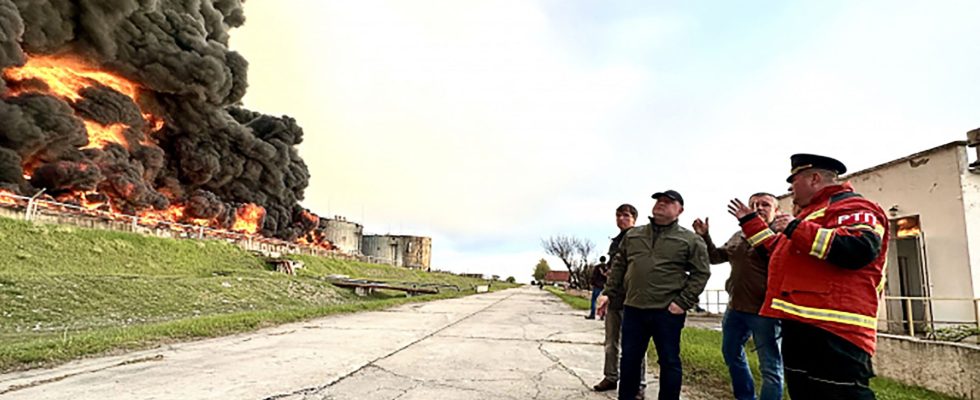On the 429th day of war, the Ukrainian counter-offensive became more and more precise. According to Andriy Zagorodnyuk, the country’s former defense minister, Ukraine has “a very large force which will make it possible to achieve significant gains”. Economically, it is time for de-escalation between Ukraine and its European neighbors. An agreement between the European Commission and five EU countries which blocked the export of cereals has been reached.
Russia, for its part, is suspected by Spain of continuing to export its hydrocarbons to the European market, with the help of nominee countries. A few hundred kilometers from the border, Pope Francis met Ukrainian refugees in a church in Budapest. The sovereign pontiff took the opportunity to castigate the migration policy and the reception of refugees practiced by Hungary, in the face of Prime Minister Viktor Orban.
Crimea: a fire in a Russian oil depot after a drone attack
A Russian oil depot is engulfed in flames in the port of Sevastopol, in Crimea, where part of the Russian fleet is stationed in the Black Sea. “A fire is in progress at an oil depot in Kazatchia Bay […]. According to initial information, it was caused by a drone attack,” said the governor of Sevastopol, Mikhail Razvojayev, taken over by AFP. About sixty firefighters were dispatched to the scene to control the fire, which s currently extends over 1,000 m². According to the Russian authorities, the situation should not improve before this evening.
Pope Francis meets Ukrainian refugees in Hungary
Second day in Hungary for Pope Francis, who today meets Ukrainian refugees at the neo-Gothic church of Saint Elisabeth in Budapest. Reduced by pain in his knees forcing him to move around in a wheelchair, the sovereign pontiff collected the testimonies of 600 exiles present for the occasion.
Faced with Hungarian Prime Minister Viktor Orban, present in the audience, he also castigated “the rigidity”, the “closures” and the tendency “to withdraw”. A thinly veiled spade at Hungarian policy in terms of welcoming migrants and refugees. Two million Ukrainians have passed through Hungarian soil since the start of the conflict, but only 18 of them have been granted refugee status in 2022.
Ukrainian cereals: Brussels finds an agreement with 5 countries
The European Commission and five EU countries reached an agreement this Friday, April 28 on the thorny subject of the transit of Ukrainian cereals on their soil. This commitment provides for the end of import bans, which will be accompanied by “exceptional safeguard measures” for wheat, corn, rapeseed and sunflower seeds.
The 27 member countries of the European Union had, in May 2022, abolished customs duties on agricultural products exported by Ukraine. The operation was to allow kyiv to transit its goods by land, since access to the rest of the world by the Black Sea was blocked by the Russians. But the massive influx of foodstuffs has deeply destabilized the internal markets of the countries bordering Ukraine, causing prices to fall. Poland, Hungary, Slovakia, Bulgaria and Romania have therefore successively closed their borders to Ukrainian agricultural products.
Madrid opens an investigation into the possible entry of Russian oil via third countries
Russian oil in Spain? This is feared by Madrid, which announced on Friday the opening of an investigation into the possible entry of hydrocarbons prohibited on its territory. “Faced with the slightest suspicion, it is necessary to check whether the imported products come from the place indicated or from another country, and if there has been any irregularity”, explained the Minister for the Ecological Transition. Teresa Ribera.
The import of Russian petroleum products has indeed been prohibited on European Union territory since February 5th. Many experts nevertheless suspect Russia of continuing to export oil to the European Union using India or China as a cover.
“We will reconquer large parts of our territory”, according to the former Ukrainian Minister of Defense
In an interview given to L’Express, Andriy Zagorodnyuk, the former Ukrainian Minister of Defense in office from 2019 to 2020, is rather optimistic about the continuation of the conflict, and in particular the counter-offensive which has been preparing for a few days. “We have a very strong force that will allow us to achieve significant gains,” he announced.
The one who is today president of the Ukrainian think tank Center for Defense Strategies also relies on the weaknesses of Russian strategy. “You can see very clearly the limits of the Russian army, which relies largely on unskilled forces. Their current doctrine, especially in Bakhmout, is simple: it is a question of sending as many soldiers as possible to the assault.”
